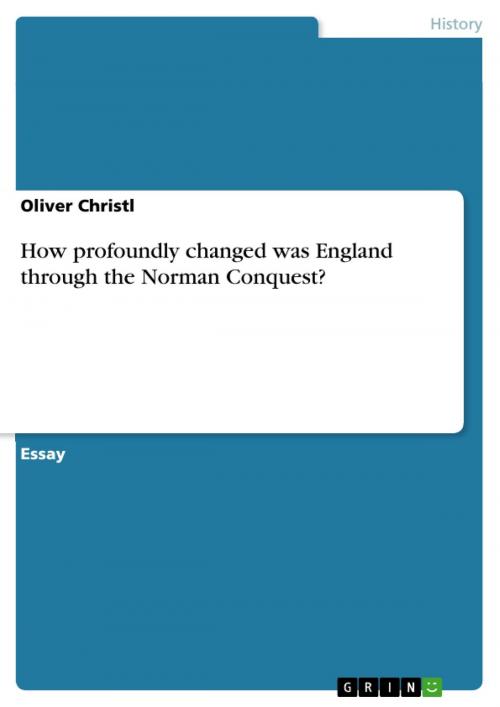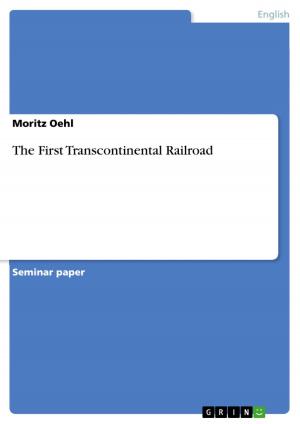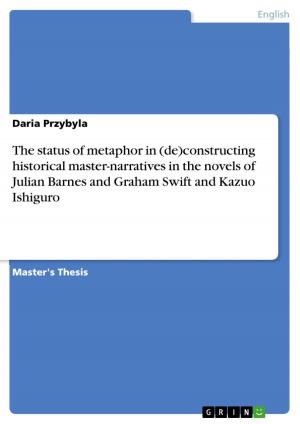How profoundly changed was England through the Norman Conquest?
Nonfiction, History, European General| Author: | Oliver Christl | ISBN: | 9783640417964 |
| Publisher: | GRIN Publishing | Publication: | September 3, 2009 |
| Imprint: | GRIN Publishing | Language: | English |
| Author: | Oliver Christl |
| ISBN: | 9783640417964 |
| Publisher: | GRIN Publishing |
| Publication: | September 3, 2009 |
| Imprint: | GRIN Publishing |
| Language: | English |
Essay from the year 2005 in the subject History Europe - Other Countries - Middle Ages, Early Modern Age, grade: 2,0, University of Birmingham, language: English, abstract: I. Introduction In the centuries before 1066 England had experienced a number of invasions from oversee. But none was as lasting as the Norman Conquest after the battle of Hastings. Although William the Conqueror claimed to be the legitimate heir on the throne of England and was interested in retaining English institutions and customs, the difference in culture and political practice was obvious. Thus, it is likely to assume that the installation of a foreign hierarchy in England could only be achieved with a great effort and was accompanied by certain changes. This essay investigates how profoundly changed England was through the Norman Conquest. Therefore, in examining the influence on major features of the Anglo-Saxon hierarchy, the investigation first focuses on changes in the English language and society, then on the Norman government in England and, finally, on the structure of landholding in Anglo-Norman England. II. Language and Society It often is assumed that the Norman Conquest in 1066 brought an immense change in the society of England. And indeed, there is some evidence for a foreign influence on people's cultural habits and everyday life. Thus, the status of the English language seems to be profoundly affected, as it was superseded by the Latin language in the years after the conquest. Latin, which had already been very influential before 1066, replaced English as the universal and official centralizing language in England. However, this is only true for the written language of the government records and literature. With an estimated number of at the most 10,000 Normans that settled in England as a result of the conquest and a native English population of at least 1,000,000 people , it is unlikely that the use of language changed profoundly for the majority of the native speakers after the conquest. Gradually, the new language was assimilated by the English language. It can, therefore, be argued, that the Norman influence gave 'new life' to the English language by 'releasing it from official constraints and then by enriching its vocabulary with numerous words derived from French and Latin' ; but it did not cause a radical change in the language's use or structure. This argument is confirmed by the fact, that, with the mass of people having problems to understand the new leading churchmen from the Normandy, a rapid production of collections of homilies and other religious writings in English was necessary during the years after the Norman
Essay from the year 2005 in the subject History Europe - Other Countries - Middle Ages, Early Modern Age, grade: 2,0, University of Birmingham, language: English, abstract: I. Introduction In the centuries before 1066 England had experienced a number of invasions from oversee. But none was as lasting as the Norman Conquest after the battle of Hastings. Although William the Conqueror claimed to be the legitimate heir on the throne of England and was interested in retaining English institutions and customs, the difference in culture and political practice was obvious. Thus, it is likely to assume that the installation of a foreign hierarchy in England could only be achieved with a great effort and was accompanied by certain changes. This essay investigates how profoundly changed England was through the Norman Conquest. Therefore, in examining the influence on major features of the Anglo-Saxon hierarchy, the investigation first focuses on changes in the English language and society, then on the Norman government in England and, finally, on the structure of landholding in Anglo-Norman England. II. Language and Society It often is assumed that the Norman Conquest in 1066 brought an immense change in the society of England. And indeed, there is some evidence for a foreign influence on people's cultural habits and everyday life. Thus, the status of the English language seems to be profoundly affected, as it was superseded by the Latin language in the years after the conquest. Latin, which had already been very influential before 1066, replaced English as the universal and official centralizing language in England. However, this is only true for the written language of the government records and literature. With an estimated number of at the most 10,000 Normans that settled in England as a result of the conquest and a native English population of at least 1,000,000 people , it is unlikely that the use of language changed profoundly for the majority of the native speakers after the conquest. Gradually, the new language was assimilated by the English language. It can, therefore, be argued, that the Norman influence gave 'new life' to the English language by 'releasing it from official constraints and then by enriching its vocabulary with numerous words derived from French and Latin' ; but it did not cause a radical change in the language's use or structure. This argument is confirmed by the fact, that, with the mass of people having problems to understand the new leading churchmen from the Normandy, a rapid production of collections of homilies and other religious writings in English was necessary during the years after the Norman















